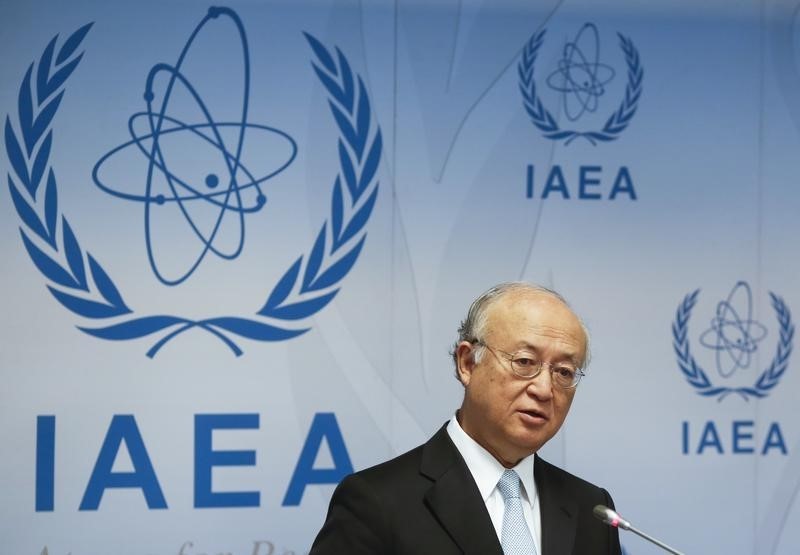By Shadia Nasralla
VIENNA (Reuters) - The International Atomic Energy Agency (IAEA) said on Tuesday it received substantive amounts of information from Iran aimed at quelling concerns its nuclear past had military elements, although it was too early to say whether any of it is new.
The nuclear watchdog also warned that it will run out of money next month to monitor implementation of nuclear accords with Iran unless it gets more funding from member states to cover costs of the work set to reach around $10 million a year.
Iran had for years been stonewalling an investigation by the U.N. nuclear watchdog into the possible military dimensions of its atomic programme, but delivered on its latest promise to send further data to the IAEA by mid-August.
IAEA chief Yukiya Amano told reporters the agency received a "substantive volume" of information from Iran on Aug. 15.
"At this stage it is premature to say if there is any new information or not... We are now analysing it," Amano said. "(It) could be even misleading to provide a partial assessment."
Under the deal between Tehran and six world powers reached on July 14, sanctions relief for Iran hinges on IAEA reports on its past and present nuclear programme.
IAEA NEEDS MORE MONEY
Amano said he had asked member states for contributions to ensure the IAEA's work on Iran can continue.
So far, costs for its Iran activities have been met through extra-budgetary contributions from member states. But Amano said the 800,000 euros ($924,000) per month the agency receives to verify current Iran nuclear agreements would be exhausted by the end of next month.
The IAEA will need an additional 160,000 euros per month in the run-up to the implementation of the agreement which could happen in the first half of next year. Once it is implemented, the agency will need an annual 9.2 million euros ($10.6 million) to ensure verification of the deal.
Following Amano's request, the United States - the agency's biggest financial contributor - said it was committed to ensuring it had enough money for its Iran operations.
Amano said the agency will need substantially more analysts, inspectors and new equipment to fulfil its role under last month's deal. It currently has around 4-8 inspectors on the ground in Iran at any one point.
The IAEA has come under pressure, particularly from U.S. Republicans, for not disclosing a roadmap agreement with Iran which it signed alongside the July deal to resolve concerns about PMD. Iran says its nuclear work is peaceful.
Reza Najafi, Iran's envoy to the IAEA, asked whether Tehran had submitted new information about its nuclear past to the agency, told reporters both Iran and the IAEA were bound not to disclose details of the roadmap.
He also declined to explain whether IAEA inspectors would be allowed to inspect Iran's Parchin military site, where some states accuse the Islamic Republic of having conducted nuclear-bomb related experiments.
Amano, who said he would be available for a third term to head the IAEA beyond 2017, said the verification deal with Iran would not serve as "precedent" for weaker standards, but repeatedly declined to answer questions on any details.
"This is the most robust safeguard regime in the current world," Amano said.

($1 = 0.8699 euros)